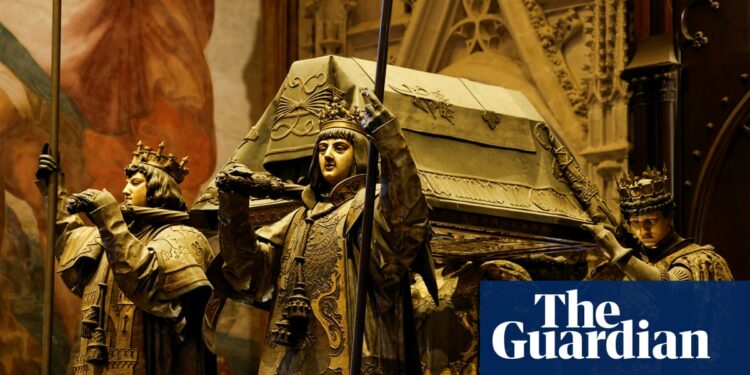A 20-year genetic investigation of the remains of Christopher Columbus has turned conventional historical wisdom on its head by concluding that the explorer whose voyage to the New World changed the course of global history may have been a Spanish Jew rather than a son of Genoa.
The claim raises the intriguing prospect that the man who played a central part in the creation of Spain’s mighty empire hailed from the very community that his patrons, King Ferdinand and Queen Isabella, expelled from their kingdom in the same year Columbus reached the Americas.
The findings of the investigation were announced on Saturday night during a special programme shown on the national broadcaster, RTVE, to coincide with Spain’s national day, which commemorates Columbus’s arrival in the New World on 12 October 1492.
José Antonio Lorente, a forensic medical expert at the University of Granada who has led the research, said his analysis had revealed that Columbus’s DNA was “compatible” with a Jewish origin.
“We have very partial, but sufficient, DNA from Christopher Columbus,” he said. “We have DNA from his son Fernando Colón, and in both the Y [male] chromosome and mitochondrial DNA [transmitted by the mother] of Fernando there are traces compatible with a Jewish origin.”
While Lorente acknowledged that he had not been able to pinpoint Columbus’s place of birth, he said the likelihood was that he had come from the Spanish Mediterranean region.
“The DNA indicates that Christopher Columbus’s origin lay in the western Mediterranean,” said the researcher. “If there weren’t Jews in Genoa in the 15th century, the likelihood that he was from there is minimal. Neither was there a big Jewish presence in the rest of the Italian peninsula, which makes things very tenuous.”
Given that there were no solid theories nor clear indications that Columbus could have been French, Lorente added, the search area narrowed still further.
“We’re left with the Spanish Mediterranean area, the Balearic islands and Sicily. But Sicily would be strange because then Christopher Columbus would have been written with some trace of Italian or the Sicilian language. That all means that his most likely origin is in the Spanish Mediterranean area or the Balearic islands which belonged to the crown of Aragón at the time.”
According to RTVE, Lorente’s findings have put an end to 500 years of speculation over Columbus’s birthplace and nationality. Over the centuries, it has been suggested that the explorer could have been Genoese, Basque, Catalan, Galician, Greek, Portuguese or Scottish. After analysing 25 possible places, then focusing on a shortlist of eight, Lorente alighted on western Europe.
His history-changing conclusions, however, have been greeted with extreme caution by some of his peers.
“Unfortunately, from a scientific point of view, we can’t really evaluate what was in the documentary because they offered no data from the analysis whatsoever,” Antonio Alonso, a geneticist and former director of Spain’s National Institute of Toxicology and Forensic Sciences told El País.
“My conclusion is that the documentary never shows Columbus’s DNA and, as scientists, we don’t know what analysis was undertaken.”
Rodrigo Barquera, an expert in archaeogenetics at the Max Planck Institute for Evolutionary Anthropology, said he was surprised the findings had been shared without prior scrutiny from others in the scientific community.
“Normally, you send your article to a scientific journal,” he told El País. “An editor is then assigned to the piece and at least three independent reviewers examine the work and decide whether it’s scientifically valid or not. If it is, it gets published and so the rest of the scientific community can say whether they agree with it or not. Putting it on the screen, far from that dialogue and with all this media focus gets in the way of the scientific community being able to say something about it.”
Lorente defended his actions to the same newspaper, saying: “Our team and the university have always considered this study into Christopher Columbus and his family as a single, joined-up and inseparable unit, and nothing will be published until the investigation is completed.”
Saturday’s revelation came two days after Lorente and his team said that DNA analysis of the remains of Columbus, his son Fernando and his brother Diego “definitively confirmed” that the partial skeleton kept in a tomb in Seville Cathedral was that of the famous navigator.
Although Columbus died in the Spanish city of Valladolid in 1506, he wanted to be buried on the island of Hispaniola, which is today divided into Haiti and the Dominican Republic. His remains were taken there in 1542, moved to Cuba in 1795, and then brought to Seville in 1898 when Spain lost control of Cuba after the Spanish-American war.
If Columbus was a Sephardic Jew – Sefarad being the Hebrew name for the Iberian peninsula – his identity would be a significant historical irony, and something he would have been keen to conceal from society and his illustrious patrons.
His arrival in the Americas paved the way for the rise of Spain’s dazzlingly rich and powerful American empire, which rose just as Ferdinand and Isabella, who sponsored Columbus’s voyages, expelled Spain’s Jews amid antisemitic fears about supposed racial purity. Centuries of persecution, pogroms and regional expulsions culminated in 1492 when the country’s Jewish population was ordered into exile, forced to convert to Catholicism or burned at the stake.
In 2015 Spain sought to atone for the expulsion, which it termed “a historic mistake” by passing a time-limited law offering Spanish citizenship to the descendants of the Jews who were driven from the country at the end of the 15th century.
About 132,000 people of Sephardic descent applied for citizenship before the offer elapsed in October 2019. More than half of those who applied were from Latin American countries including Mexico, Colombia, Venezuela, Argentina, Peru, Panama, Chile and Ecuador.
Source link : https://www.theguardian.com/world/2024/oct/13/christopher-columbus-was-spanish-and-jewish-documentary-reveals
Author :
Publish date : 2024-10-13 05:28:00
Copyright for syndicated content belongs to the linked Source.


